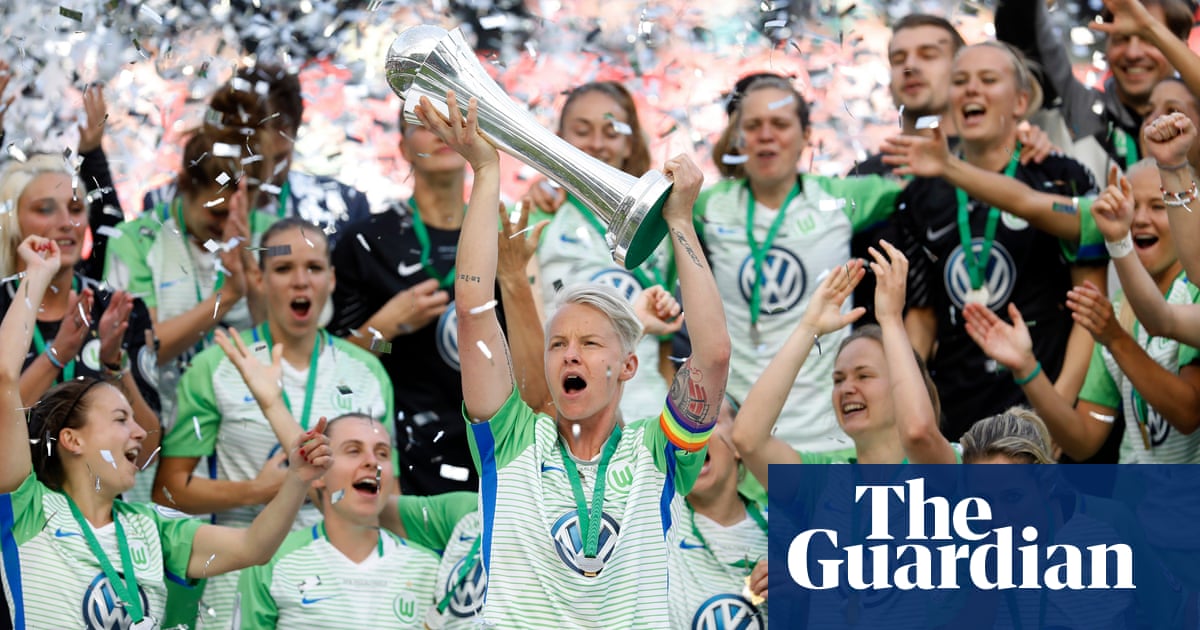
For much of the final 14 of his 22 years at Arsenal, Arsène Wenger was a study in frustration. The free thinker who brought trophies and glory to Arsenal in his blazing first eight years at the club, ushering in a revolution across the Premier League with his use of data, approach to talent scouting, commitment to technically intricate football and careful attention to the diet and lifestyle of the players under his watch, was suddenly transformed into a snippy crank. The sideline fiddling with his parka zipper, the tetchy press conference responses, the comic insistence that he “almost” signed every successful player in Europe, the disgusted tossing of the tiny water bottle as his once-invincible team gave away another lead, endured another slapstick mishap at the back, squandered another title challenge: the visual lore of Late Wenger has, in its own way, become a series of cliches, a kind of stock carousel for any once-great manager on the brink of professional disintegration.
The cause of Wenger’s great anguish through this long decline, of course, was what he memorably described as “financial doping”: the emergence – first with Roman Abramovich at Chelsea, then with the Abu Dhabi United Group’s takeover of Manchester City – of a new class of billionaire club owners who turned the Premier League into a simple spending contest tilted, seemingly perpetually, in favor of the teams controlled by plutocrats.
Season after season, Arsenal struggled valiantly to live the Wengerian truth of thrift and delayed gratification, selling their best players, patiently paying off the new stadium at Ashburton Grove, jacking up ticket prices to stay in touch with the money boys. Chelsea and the Manchester clubs feasted on all the trophies; Arsenal fans were left to pick through the crumbs of their club’s responsible balance sheet. The Gunners may have lost the art of winning the Premier League, but their income statements were world class.
Wenger’s press clippings from this period are filled with the rage of a man who feels that the tide of history has moved definitively against him. “It is a satisfaction for a club to live within its natural resources,” he said in early 2009. “We live in the real world. City are in a different world.”
A few months later he was at it again: “I am always insisting that in our job you should live with your resources, because it is always defendable that you make money if it is linked to the income you earn inside the club, it is not if it is not linked to the income made inside the club.”
Papa Arsène became a lone voice honking in the fiscal wilderness. Philosophy, reason, morals, pleasure: Wenger appealed to all of them in his attempt to convince the Premier League to rein in spending and force clubs to live within their means. To the end of his time at Arsenal he remained delusionally stubborn in his commitment to the club’s self-sustaining business model (“I believe, and I take full responsibility for this, that we can be competitive the way we run the club”: that’s from 2011).
Wenger’s economic thinking was formed at a young age, from the values he absorbed by watching his parents at work in their bistro in rural Alsace. For Wenger, childhood in the starchy world of 1950s Duttlenheim was, as he writes in his autobiography, “an education in resourcefulness, in tenacity, in passion, in physical effort”. Self-control, responsibility, and stamina were the values most highly prized; exaggeration, and recklessness were looked down upon.
The word “excesses” appears three times in the first 20 pages of Wenger’s autobiography, and not once is it used positively. From those early years in Alsace he learned to find the beauty in austerity, in material and cultural privation. As a child, his football team played with “no jerseys, no coach, and no referee”, and in the village, he writes, “we didn’t have much. I sometimes wonder whether my passion might not have been born out of that frustration: that small world, those so scarce words we exchanged, those matches our team lost, that pitch that looked so little.”
For much of the past two decades Wenger’s long project to create a new model for club football across England and Europe – one in which self-sufficiency is paramount, the realm of the financially possible has real limits, and creativity is defined by the negotiation of material constraints – appeared doomed. The war for the sport’s soul was lost. Football had been sold out to sovereign wealth funds, gas barons, and private equity buffoons, all those Abramoviches and Mansours and Al-Khelaifis clapping unsmilingly from on high while their expensively assembled squads nightsticked hapless opponents into the dirt. The future, seemingly, belonged to the wealthy.
The future, for now at least, still does: Manchester City, after all, are on the verge of winning their fourth Premier League title in a row. But as the season comes to an end, it’s worth reflecting on how meaningfully the regulatory culture of European soccer, and English soccer in particular, has shifted over the past six months.
The Premier League, of course, is much changed from Wenger’s time at the Emirates. Even Arsenal’s old commitment to the self-sustaining business model has evolved. The club enjoyed 16 consecutive profitable seasons until 2018, making almost £400m along the way, but the pandemic-era hit to gate receipts and the loss of Champions League football have seen the accounts dip into the red in recent seasons (though Arsenal’s most recent results forecast a return to “a self-sufficient financial base” with continued participation in Europe). There’s so much wild tinkering at work in the administration of the game today – VAR! An expanded World Cup! An expanded Club World Cup! Body cams on referees! Blue cards! No more blue cards! – that it can often feel as if the footballing authorities are as clueless about the sport’s future direction as the fans are.
But in the realm of financial regulation, the past six months do seem to herald a real change. After years of shambling inaction, the aggression with which the Premier League has prosecuted breaches of the profitability and sustainability rules – while motivated by a spirit of regulatory competition and designed, in part, as a performance to nullify government efforts to impose an independent watchdog on the sport – has been genuinely surprising. The double strike of the new anchoring and squad cost rules provisionally approved before the Premier League’s annual general meeting in June has been another shock to the senses. These rule changes promise a future that, while not entirely equal (the Premier League will still be a league of financial blimps and mere balloons), will nevertheless impose some measure of restraint on the spending of the biggest, richest clubs. Since leaving Arsenal, Wenger has occupied the role of Fifa’s Chief of Football Development, a sapiential perch from which he pontificates about the state of the footballing universe. But his real legacy is in the Premier League, and it continues to grow.
The fact that it was Manchester City who voted against the measure to “anchor” each club’s spending on wages and transfer fees to a multiple of the bottom club’s TV revenue suggests that the league is traveling, finally, in the right direction on basic questions of fairness and competitive balance. After the sleaze and recklessness of the post-Abramovich Gilded Age, the Premier League appears, over the objections of the biggest and most well resourced clubs, to be entering a new progressive era of fiscal prudence and limitation. Regulation, accounting, and litigation will be the hallmarks of this new age, in which clubs will rise and fall as much by what goes on in the books and arbitration chambers as on the field.
On the other hand, these changes arrive at a time when, for some of the billionaire-owned clubs, all the early benefits of rule by plutocrat have already accumulated and a new regime of fiscal responsibility has been put in place. At Manchester City, for instance, the trophies, TV riches, and millions of adoring new fans are secure. The club posted a profit of £80m last financial year, comfortably the highest in the league, and made £122m on player sales: the fiscal strength that financial doping buys has been fully worked into the corporate bloodstream, giving the Sky Blues a structural advantage over less monied rivals that will endure for years, perhaps even decades, even under the austerity of a more strictly regulated league. The clubs that bought success under the old rules arguably won’t stand to lose all that much under the new regime. By now, their position at the top of the sport may be unassailable, and fresh rules to prevent other pretenders from taking the sugar daddy route to glory could simply end up blocking the ambitions of smaller clubs, ossifying European soccer’s existing order. A more parsimonious future may simply be a recipe for more springtime nights in the Champions League featuring Real Madrid, Bayern Munich, PSG and the rest of the usual suspects.
And yet. It’s possible to retain some optimism, to imagine that this new age of regulation and restraint will embolden clubs and managers to find perfection and success within the strictures of a new economy, to do more with less. “The beauty of sport is to respect the rules and to win,” Wenger once said. “People who do not should not be allowed to win.” For a long time, this seemed like a losing proposition, condemned to failure by a small coterie of super-rich clubs able to bend the sport’s reality to their own limitless financial will. But over the past season, the future that Wenger spent all those years fighting for – an alternative reality in which the rules are designed to take silly money out of the sport – has lurched suddenly, if precariously, into view.
Squad cost ratios, anchoring, crackdowns on the reckless spenders, a new spirit of activism rising up the football pyramid: will all of this create a new playing field for England’s top flight, or will it simply freeze the hierarchy embedded across the Premier League from two decades of laissez-faire regulation and casino spending? Has Arsène Wenger won, at last, the culture war over money in football he lost as a manager? We are about to find out.












